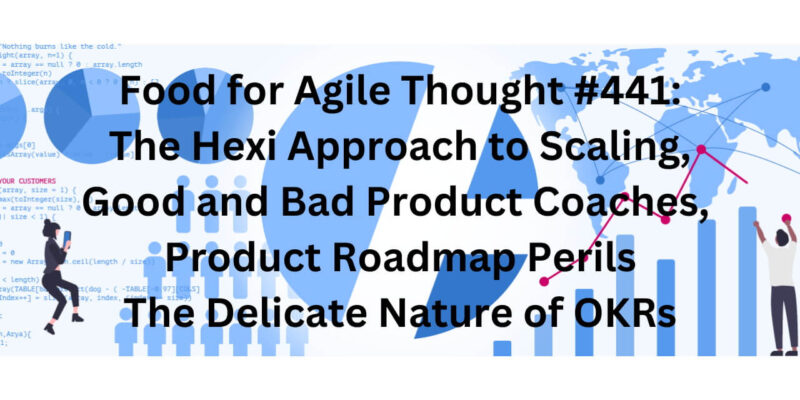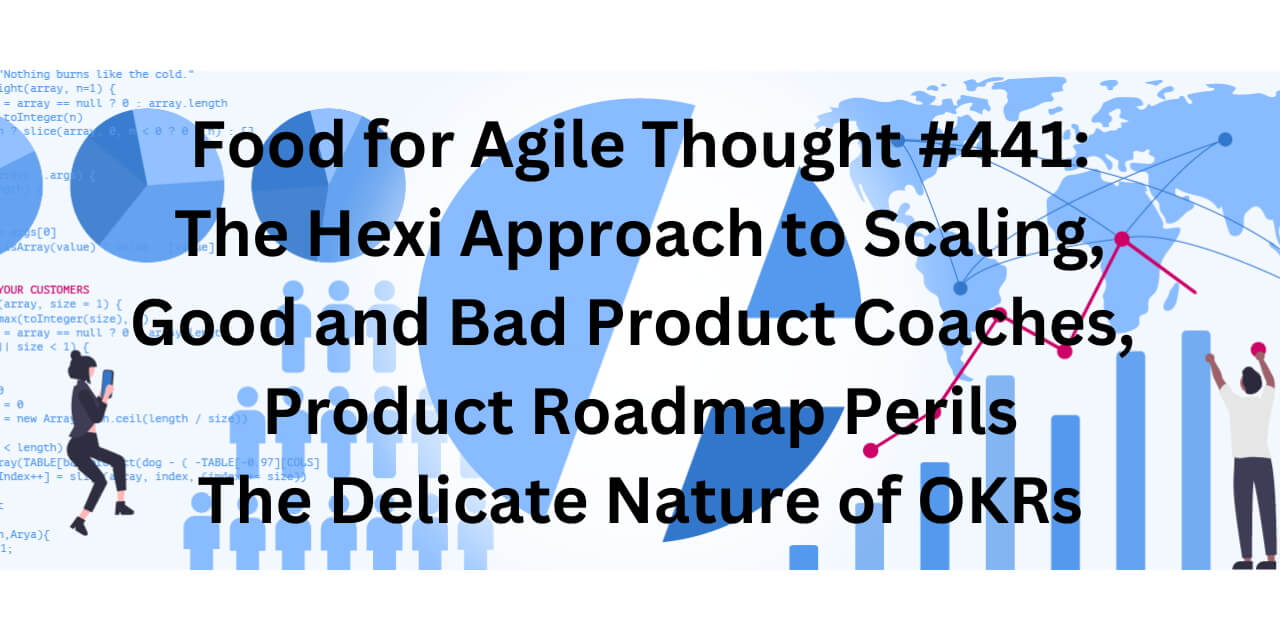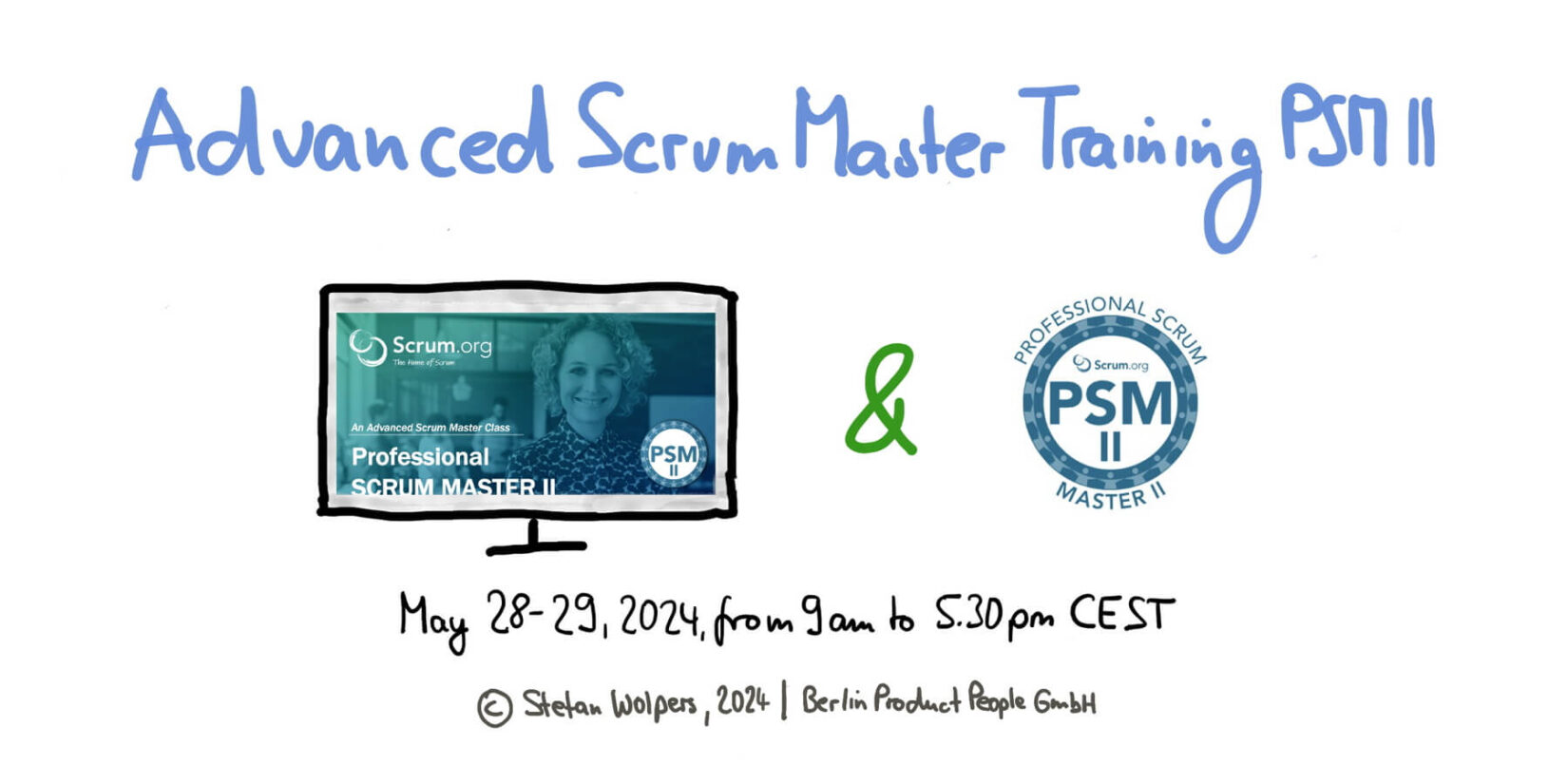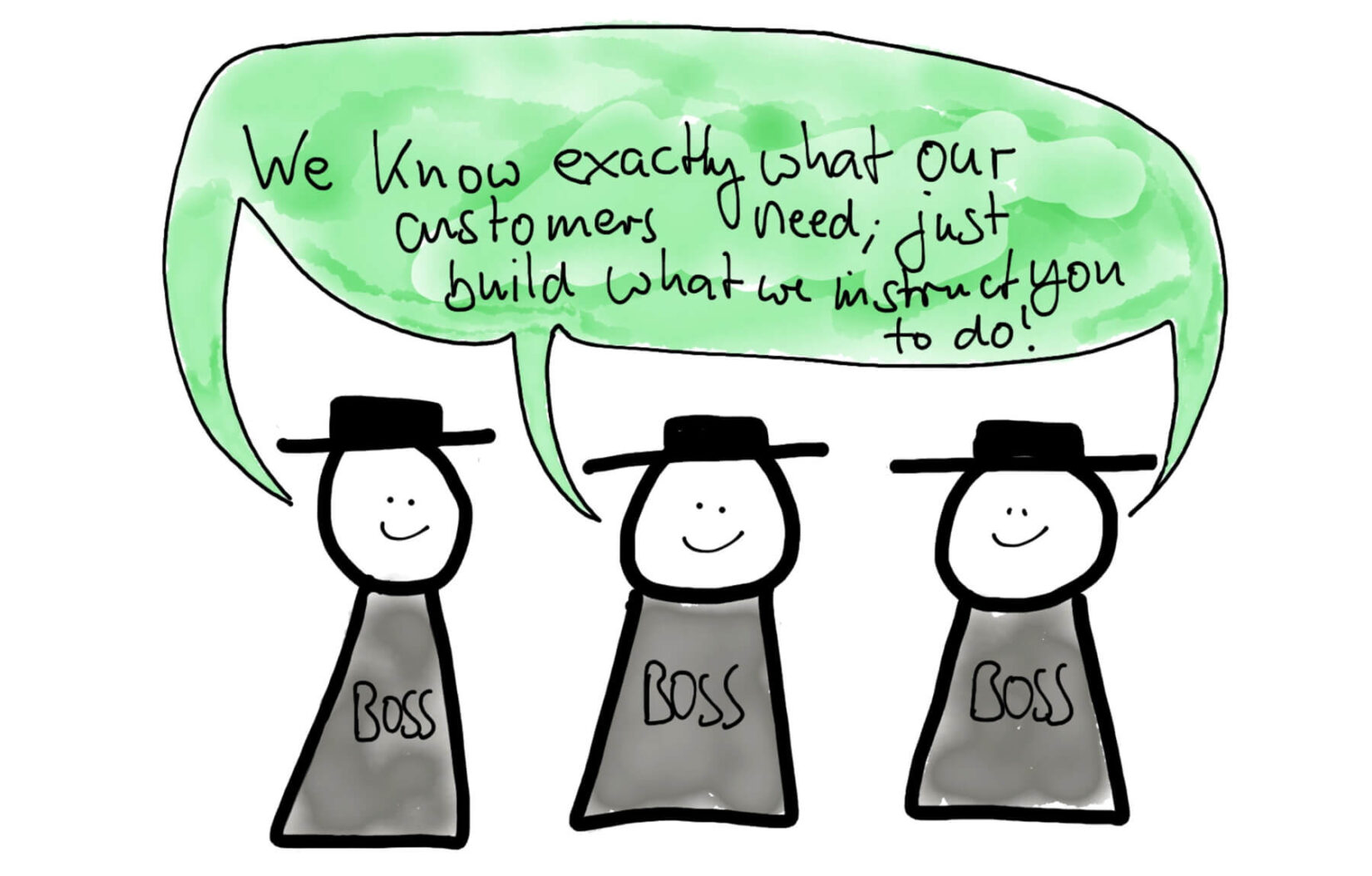TL; DR: The Hexi Approach to Scaling — Food for Agile Thought #441
Welcome to the 441st edition of the Food for Agile Thought newsletter, shared with 42,489 peers. This week, Dave Snowden and Nigel Thurlow present the Hexi approach, a multi-method strategy enhancing agility through complex adaptive systems. Joshua Arnold advocates for a Quarterly Look Ahead process, and Annie Duke and Lenny Rachitsky explore decision-making improvements using techniques like the “3Ds” framework and pre-mortems. Also, we reveal the hidden costs of offshore software consulting and delve into system-level anti-patterns of stakeholders. Additionally, Willem-Jan Ageling revisits the Agile Manifesto’s principles.
Then, Chris Beswick addresses strategic innovation frameworks, while Marty Cagan emphasizes the critical role of experienced product coaches. Ant Murphy advocates for empathy in problem-solving, and Leah Tharin highlights key pitfalls in product road-mapping, stressing strategic, focused approaches for organizational success.
Lastly, Daniele Davi discusses Kaizen and its role in Agile, emphasizing continuous improvement. Maarten Dalmijn compares OKRs’ fragility to coral, stressing the need for optimal conditions, while Letitia Rohaise critiques traditional personas, advocating for inclusive methods like Jobs-To-Be-Done. Moreover, Paweł Huryn offers strategies for effective surveys, focusing on improving response quality. Finally, Joca Torres explores boosting team productivity through role clarity and method optimization, sharing insights from his experiences across multiple companies.
🎓 July 1, 2024: Learn to Master Your Most Important Artifact w/ the Advanced Product Backlog Management Course for Just $99!
👉 Please note:
- The course includes membership in a new community of agile professionals.
- Become fully reimbursed if you choose to join the Advanced Product Backlog Management Cohort of June 13-July 11, 2024, at € 399.
- The course will only be available until July 8, 2024, for sign-up!
The most popular discussion on LinkedIn last week was: You Butcher Your Daily Scrum If You Play “Get up, Stand up.”
Did you miss the previous Food for Agile Thought’s issue 440?
🗞 Shall I notify you about articles like this one? Awesome! You can sign up here for the ‘Food for Agile Thought’ newsletter and join 42,000-plus subscribers.
🎓 Join Stefan in one of his upcoming Professional Scrum training classes!
🏆 The Tip of the Week: The Hexi Approach
and (via Scrum.org): 📺 Scaling Complex Systems by Building on Agile Frameworks
Dave Snowden and Nigel Thurlow introduce the Hexi approach to evolving agility through a ‘best of breed,’ multi-method approach, utilizing complex adaptive systems for enhanced scalability and value flow.
🍋 Lemon of the Week
We are Lemon-free this week.
➿ Agile & Scrum
: Top-down “Priority Lists” don’t work
Joshua Arnold critiques top-down “Priority Lists” for overloading teams without addressing core issues, suggesting a Quarterly Look Ahead process that aligns roadmaps with team capacities to foster sustainable, squad-centric product development.
and : 🎙 A Framework for Making Better Decisions
Annie Duke, former pro poker player and decision expert, and Lenny Rachitsky discuss techniques to enhance decision-making, including the “3Ds” framework, pre-mortems, and the strategic use of language to foster better organizational decisions.
(via Test Double): How to calculate the real ROI of offshore consulting
The Test Double Editorial Board scrutinizes the actual costs of offshore software consulting, emphasizing that the low hourly rates are often eclipsed by hidden expenses like communication and maintenance, advising a focus on quality and value for sustainable software solutions.
: How relevant are the Agile principles today?
Willem-Jan Ageling assesses the relevancy of the Agile Manifesto’s principles today, finding them crucial yet requiring adaptation to modern challenges like increased delivery frequency and remote communication, urging a shift from rigid methods to flexible, value-focused approaches.
🎓 🖥 🇬🇧 Advanced Professional Scrum Master Training w/ PSM II Certificate — May 28-29, 2024
Discover Scrum’s four success principles in this official Scrum.org class for Advanced Scrum Masters, including the industry-acknowledged PSM II certification. This PSFS training class is in English.
Enjoy the benefits of a live virtual immersive class with like-minded agile peers from 09:00 – 17:30 CEST.
Learn more: 🖥 💯 🇬🇧 Advanced Professional Scrum Master Training w/ PSM II Certificate — May 28-29, 2024.
Customer Voice: “Since about 12 people have already asked me these last 2 days: Yes, taking one of Stefan Wolpers’ classes is a mind-blowing experience. He’s actually the most adroit facilitator I’ve met after Guy Kawasaki & Roland Busch. It all flows like a silk ribbon in a soft spring breeze but with a strong authenticity that prevents the thing from feeling all Del Monte Canned Corporate Facilitation(tm). It may be due to his seemingly effortless mastery of the Liberating Structures. He doesn’t “teach to the test,” yet when you take the open practice assessments; you somehow score 95+ the first time. I dunno, it’s magic or Mozart, you pick.” (Source.)
👉 From time to time, we can offer last-minute seats for training classes at cost to individuals who do not have access to a corporate training budget. If you would like to be notified about these opportunities, please register here.
🎯 Product
: When Building a Culture For Innovation, Form Follows Function
Chris Beswick distinguishes between a culture of innovation and a Culture of innovation, emphasizing that real innovation results from systematically combining elements within a strategic framework, aligning closely with the principle “form follows function” to optimize organizational structures for continuous innovation growth.
(via Silicon Valley Product Group): Good Product Coach / Bad Product Coach
Marty Cagan emphasizes the crucial role of experienced product coaches in aiding companies to transition from feature-team models to robust product models, underscoring the necessity of real-world experience and a deep understanding of business nuances for effective coaching.
: Do you want to win arguments or solve problems?
Ant Murphy explores the distinction between winning arguments and solving problems in product management, highlighting the crucial role of empathy and curiosity in effectively collaborating with stakeholders and driving meaningful change in organizational practices.
: 7 fails of roadmap-making
Leah Tharin outlines seven common pitfalls in product road-mapping, emphasizing the importance of strategic focus over detailed estimations and reactive planning, and advocates for clear, actionable, and internally aligned roadmaps to guide long-term organizational objectives effectively.
📯 The Top Three System-Level Scrum Stakeholder Anti-Patterns
Learn how outdated organizational structures manifest themselves in system-level Scrum stakeholder anti-patterns that easily impede any agile transformation to a product-led organization. We cover the perils of a lack of transparency, limited to non-existing leadership support, and why penny-pinching is the wrong approach.
Learn more: The Top Three System-Level Scrum Stakeholder Anti-Patterns.
🛠 Concepts, Tools & Measuring
(via Medium): Kaizen
Daniele Davi explores the concept of Kaizen, a principle of continuous, incremental improvement fundamental to Agile and Lean. He connects it with Agile Manifesto principles, advocating for sustainable, team-driven enhancements that advance product quality and team dynamics.
: Why OKRs Often Slowly Wither Away
Maarten Dalmijn parallels coral’s fragility and the delicate nature of OKRs, emphasizing that, like coral, OKRs require pristine conditions to thrive and often fail in unsuitable organizational environments.
(via UX Collective): Rethinking personas: Empathy and inclusion in UX design
Letitia Rohaise critiques traditional persona use in UX design, advocating for more inclusive methods like Jobs-To-Be-Done and Empathy Maps to better capture and reflect users’ diverse needs.
: The Ultimate Guide to Surveys for Product Teams
Paweł Huryn offers a comprehensive guide on crafting effective surveys for product teams, addressing common issues like low response rates and poor data quality. He emphasizes proper preparation, strategic question formulation, and adapting survey tactics to enhance response quality and relevance in product management.
🎶 Encore
(via Medium): Measuring and managing the productivity
Joca Torres explores strategies to boost development team productivity, highlighting role clarity, strategic measurement, and method optimization. He uses examples from his roles at Locaweb, Conta Azul, Gympass, and Lopes.
📅 Scrum Training & Event Schedule
You can secure your seat for Scrum training classes, workshops, and meetups directly by following the corresponding link in the table below:
See all upcoming classes here.
You can book your seat for the training directly by following the corresponding links to the ticket shop. If the procurement process of your organization requires a different purchasing process, please contact Berlin Product People GmbH directly.
📺 Join 5,000-plus Agile Peers on Youtube
Now available on the Age-of-Product Youtube channel to improve learning, for example, about the Hexi Approach:
- Hands-on Agile 59: Tackling Fake Agility with Johanna Rothman.
- Hands-on Agile 57: Humble Planning with Maarten Dalmijn.
- Hands-on Agile 54: Overcoming Common Product Backlog Management Traps with David Pereira.
- Hands-on Agile 53: An Agile Coaches Guide to Storytelling with Bob Galen.
- Hands-on Agile EXTRA: How Elon Musk Would Run YOUR Business with Joe Justice.
✋ Do Not Miss Out and Learn About the Hexi Approach — Join the 19,000-plus Strong ‘Hands-on Agile’ Slack Community
I invite you to join the “Hands-on Agile” Slack Community and enjoy the benefits of a fast-growing, vibrant community of agile practitioners from around the world.
If you like to join all you have to do now is provide your credentials via this Google form, and I will sign you up. By the way, it’s free.
Help your team to learn about the Hexi Approach by pointing them to the free Scrum Anti-Patterns Guide:









